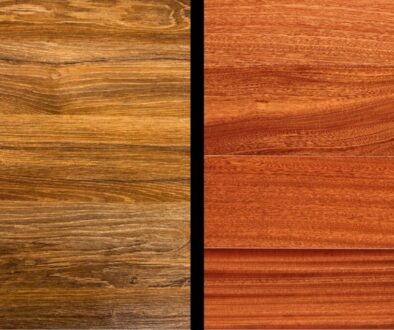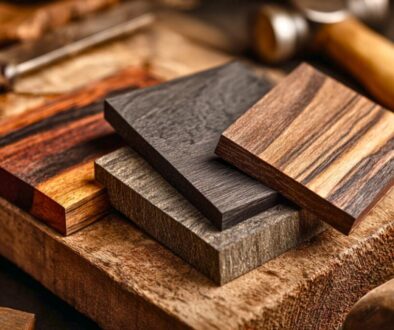Solid Hardwood Vs. Engineered Hardwood: Comparison Guide
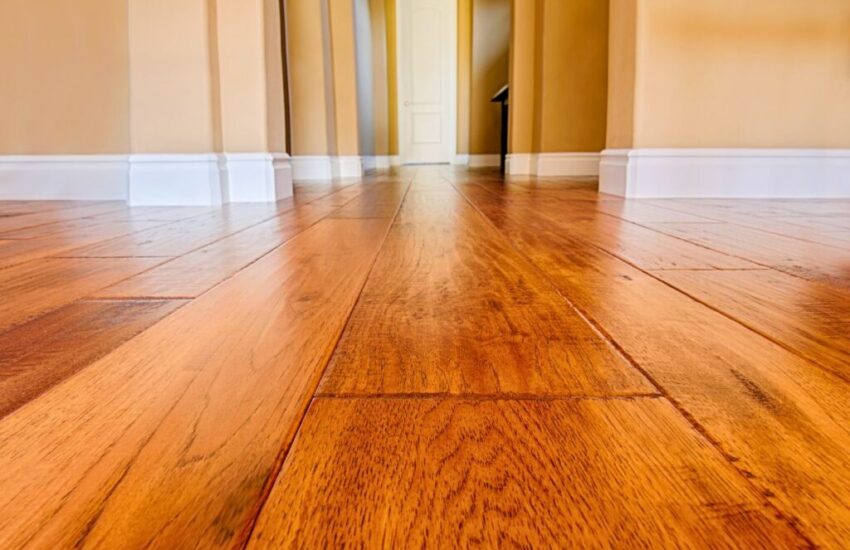
Published October 21, 2025
Choosing the right flooring defines your home’s look and feel. Natural wood brings timeless beauty, but your selection affects durability, value, and daily life for years. The debate of solid hardwood vs. engineered hardwood is crucial, as both provide unique advantages. Knowing their key differences is essential for a lasting, suitable decision.
In this article, we’ll provide a comprehensive comparison of solid and engineered hardwood. We’ll break down aspects like appearance, cost, durability, and installation to help you understand the pros and cons and choose the ideal wood flooring for your home.
Major Differences: Solid Hardwood Vs. Engineered Hardwood
Solid and engineered hardwood may look similar. However, their main differences lie in their construction. This fundamental difference affects their performance, cost, and ideal applications.
- Engineered hardwood is made of multiple layers. The top layer, called a veneer, is a thin slice of real wood. This veneer is attached to a supportive inner core, typically plywood (thin layers of wood glued together) or high-density fiberboard (HDF), which is a strong, compressed wood product. This layered structure increases stability and helps prevent the floor from warping due to moisture.
- Solid hardwood is different because it’s milled from a single, solid piece of real wood, such as oak, maple, or walnut. This means the entire plank is made of one wood species throughout, giving solid hardwood its distinctive strength and the ability to be sanded and refinished many times. However, because it’s one solid piece, it absorbs moisture more easily and can swell or warp in damp conditions.
Solid Hardwood Vs. Engineered Wood: A Quick Comparison
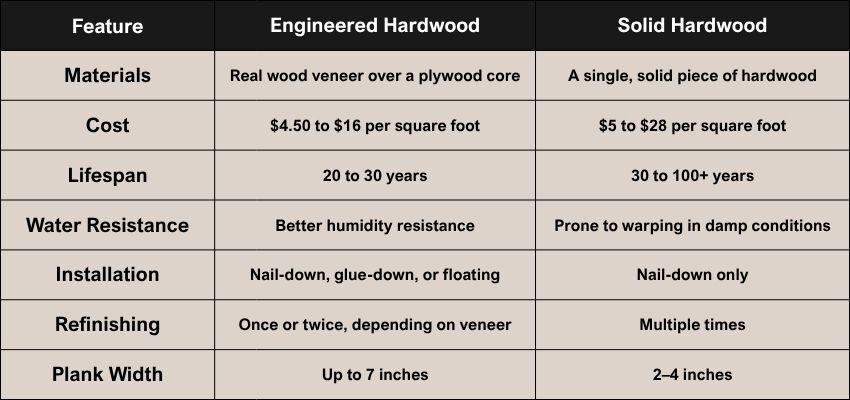
Cost
Engineered hardwood tends to be more affordable, starting around $4.50 per square foot. Solid hardwood generally ranges from $5 to $28 per square foot based on species and grade. Prefinished solid hardwood can be comparably priced, with factory finishing reducing on-site labor costs.
Lifespan And Refinishing
Solid hardwood offers superior longevity, often lasting over a century with proper care. Its thickness allows for multiple sandings and refinishings. Engineered hardwood, due to its thinner veneer, typically lasts 20-30 years and can only be refinished once or twice.
Water Resistance
Engineered hardwood has better moisture resistance. Because its core is made of plywood or high-density fiberboard, it handles humidity better and is less likely to warp. This makes it a good fit for places where moisture is common, such as basements, kitchens, and humid climates.
Solid hardwood, which is made from one piece of wood, is more sensitive to water and humidity changes, and should not be used in bathrooms or areas below ground where moisture can cause damage like swelling or cupping (edges of the boards rising).
Durability
Both flooring types offer similar surface durability. This is especially true with modern factory finishes like aluminum oxide. However, solid hardwood has a long-term advantage because it can be fully refinished, removing deep scratches or dents. Engineered flooring handles daily wear but is harder to repair if damage goes through its thin top layer.
Installation
Engineered hardwood is versatile and convenient to install. It supports several installation methods: nail-down (fastening the planks to the subfloor with nails), glue-down (adhering the planks to the subfloor using glue), or floating (the planks are attached but not the subfloor, often with a click-lock system).
This flexibility allows it to be installed over concrete, which is common in modern homes. In contrast, solid hardwood must be nailed to a wooden subfloor, a process generally requiring professional skills and tools.
Resale Value
Both flooring options increase your home’s value, though solid hardwood has a slight edge due to its prestige and long-term durability, which can enhance resale value.
Appearance
Solid and engineered hardwood look nearly identical. Plank width and edge style are key visual differences—engineered wood often has wider planks and beveled edges, while solid hardwood usually features tighter seams for a smooth finish.
Care And Cleaning
Caring for both types of wood flooring is similar. Sweep or vacuum on a regular basis to get rid of dirt and grit that increases the chances of scratches on the surface, and mop with a damp (not wet) cloth using a cleaner made specifically for wood floors. Avoid using steam cleaners—these use hot water vapor, which can damage wood by forcing moisture deep into the surface.
Environmental Impact
Engineered hardwood planks use less solid wood because only the top layer is real wood, making them more resource-efficient. However, the adhesives (glues) used to bond the layers can contain volatile organic compounds (VOCs), which are chemicals that can release fumes. Solid hardwood uses more raw wood for each plank, but it’s naturally biodegradable and can be reclaimed (salvaged and used again) or reused. When either type is sourced from responsibly managed forests, both can be environmentally sustainable.
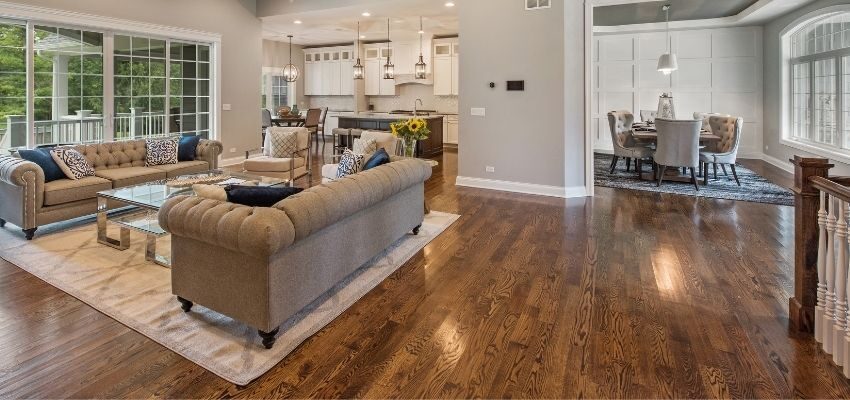
Sound
Both flooring types provide good sound quality. Solid hardwood feels denser underfoot and absorbs sound more effectively, in part because it’s nailed directly to the subfloor. Engineered hardwood can sometimes sound hollow when installed as a floating floor, since there’s a gap between the floor and the subfloor that can create a slight echo when walked on.
Sizes
Engineered hardwood often comes in wider planks, up to 7 inches, and is generally more affordable than solid wood of similar width. Solid hardwood typically ranges from 2 ¼ to 4 inches wide, with wider options costing more.
Which Is A Better Option: Solid Hardwood Vs. Engineered Hardwood Flooring
The best choice depends on your priorities and environment. Solid hardwood is durable, timeless, and can be refinished for years. It’s an excellent choice for main living spaces. Engineered hardwood is stable, easy to install, and moisture-resistant. It works well in basements, kitchens, or homes with concrete slabs.
For homeowners seeking authenticity, Vintage & Specialty Wood offers a curated selection of reclaimed and specialty hardwoods — combining beauty, durability, and sustainability.
Frequently Asked Questions
Which is better for pets?
Solid hardwood is often a better choice for homes with pets. Both types of wood can end up with scratches. Solid wood can be sanded and refinished. Deep scratches on engineered flooring often mean replacing the whole plank.
Which is more scratch-resistant?
Both flooring types have similar scratch resistance. The main difference is how they can be repaired. Solid hardwood can be sanded multiple times. Engineered flooring has limited refinishing depth.
Can either one be refinished or sanded?
Yes, but to different extents. You can sand or refinish solid hardwood several times. Engineered hardwood can typically only be refinished once or twice. It depends on the thickness of its veneer.
Which is better for installation and DIY use?
Engineered hardwood is easier to install yourself. You can use floating or glue-down options. Solid hardwood typically requires professional installation due to the expertise involved.
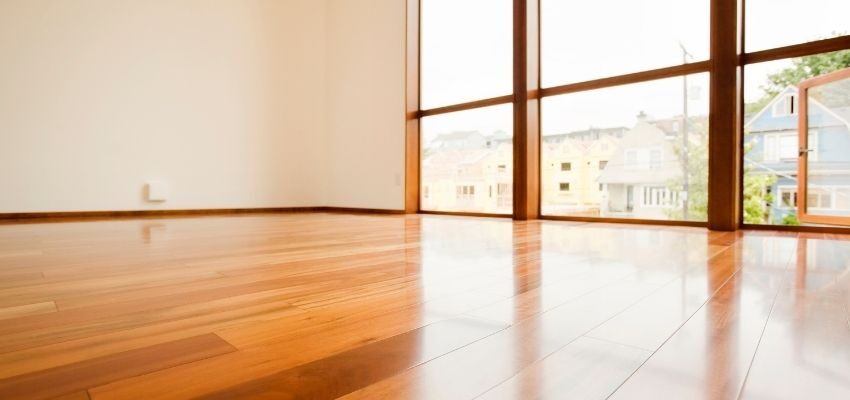
Finding The Perfect Wood Flooring For Your Home
Both solid and engineered hardwood add warmth, beauty, and value to your home. When comparing solid hardwood vs. engineered hardwood, there are key differences. Solid hardwood offers a long lifespan and can be refinished often. Engineered hardwood brings versatility and stability. Consider your space, climate, and lifestyle to confidently choose the best option.
Ready to bring the unique character of real wood into your space? Vintage & Specialty Wood offers reclaimed and specialty hardwoods that tell a story. Explore our collections to find the perfect foundation for your home.
Hire The Timber Experts For Your Next Project
Vintage & Specialty Wood should be your source of the highest quality timbers from around the world. When it comes to fabricating and installing reclaimed wood or specialty wood products in your home, we don’t cut corners. We offer many reclaimed wood and specialty wood products such as Douglas Fir, white oak, and much more. We also offer timber framing and wood flooring services as well. Contact our team today to speak to a timber expert about what Vintage & Specialty Wood can do for you.

This Blog Is Fact Checked
This content has undergone meticulous fact-checking by our team of internal experts. Gain a deeper understanding of the high editorial standards we uphold on our website here.

About The Author
Experience, exploration, and knowledge are the hallmarks of writer Rei Bayucca. Her dedication to crafting articles that both inspire and educate will leave you thinking long after you’ve finished reading.

